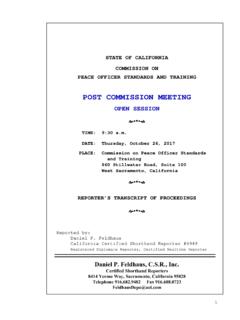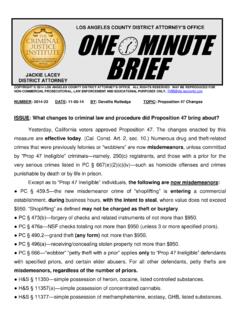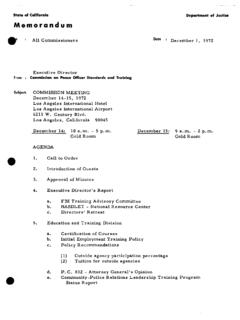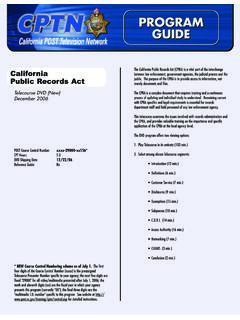Transcription of Basic Course Workbook Series - California
1 California COMMISSION ON PEACE OFFICER STANDARDS AND TRAINING Basic Course Workbook Series Student Materials Learning Domain 00 Becoming an Exemplary Peace Officer Version THE MISSION OF THE California COMMISSION ON PEACE OFFICER STANDARDS AND TRAINING IS TO CONTINUALLY ENHANCE THE PROFESSIONALISM OF California LAW ENFORCEMENT IN SERVING ITS COMMUNITIES Basic Course Workbook Series Student Materials Learning Domain 00 Becoming an Exemplary Peace Officer Version Copyright 2007 California Commission on Peace Officer Standards and Training (POST) All rights reserved. Published 2007 Workbook Correction January 14, 2009 This publication may not be reproduced, in whole or in part, in any form or by any means electronic or mechanical or by any information storage and retrieval system now known or hereafter invented, without prior written permission of the California Commission on Peace Officer Standards and Training, with the following exception: California law enforcement or dispatch agencies in the POST program, POST-certified training presenters, and presenters and students of the California Basic Course instructional system are allowed to copy this publication for non-commercial use.
2 All other individuals, private businesses and corporations, public and private agencies and colleges, professional associations, and non-POST law enforcement agencies in-state or out-of-state may purchase copies of this publication, at cost, from POST as listed below: From POST s Web Site: Go to Ordering Student Workbooks POST COMMISSIONERS Deborah Linden - Chairman Chief San Luis Obispo Police Department Michael Sobek, Vice Chairman Sergeant San Leandro Police Department Anthony W. Batts Chief Long Beach Police Department Lai Lai Bui Sergeant Sacramento Police Department Collene Campbell Public Member Robert T. Doyle Sheriff Marin County Bonnie Dumanis District Attorney San Diego County Floyd Hayhurst Deputy Sheriff Los Angeles County Scott Himelstein Public Member Ron Lowenberg Dean/Director Criminal Justice Training Center Golden West College John McGinness Sheriff Sacramento County Jeff Lundgren Deputy Sheriff Riverside County Sheriff's Department Henry T.
3 Perea Councilman City of Fresno Laurie Smith Sheriff Santa Clara County Michael Sobek Sergeant San Leandro Police Department Gil Van Attenhoven Senior Special Agent California Department of Justice George Anderson Representing Attorney General Jerry Brown - Ex Officio Member Director of Division of Law Enforcement THE ACADEMY TRAINING MISSION The primary mission of Basic training is to prepare students mentally, morally, and physically to advance into a field training program, assume the responsibilities, and execute the duties of a peace officer in society. FOREWORD The California Commission on Peace Officer Standards and Training sincerely appreciates the efforts of the many curriculum consultants, academy instructors, directors and coordinators who contributed to the development of this Workbook . The Commission extends its thanks to California law enforcement agency executives who offered personnel to participate in the development of these training materials.
4 This student Workbook is part of the POST Basic Course Training System. The Workbook component of this system provides a self-study document for every learning domain in the Basic Course . Each Workbook is intended to be a supplement to, not a substitute for, classroom instruction. The objective of the system is to improve academy student learning and information retention. The content of each Workbook is organized into sequenced learning modules to meet requirements as prescribed both by California law and the POST Training and Testing Specifications for the Basic Course . It is our hope that the collective wisdom and experience of all who contributed to this Workbook will help you, the student, to successfully complete the Basic Course and to enjoy a safe and rewarding career as a peace officer serving the communities of California . PAUL CAPPITELLI Executive Director LD 00: Becoming an Exemplary Peace Officer Table of Contents Topic See Page Chapter 1: An Introduction to Peace Officer Training The Exemplary Peace Officer (EPO) Policing Is Not Merely a Job What Peace Officers Really Do Chapter 2: The Academy Experience Leadership and Personal Responsibility The Language of Policing Techniques That Work The Policing Mission Chapter 3: Ethics and Values What is Ethics?
5 The Six Pillars of Character Government Ethics Code and the Five Principles of Public Service Ethics Chapter 4: Attributes of an Exemplary Peace Officer Good Character Proficiency Professionalism Leadership Chapter 5: Aspects of an Exemplary Decision The Quality of a Decision: Acceptable to Exemplary Chapter 6: Looking Beyond the Academy Formal and Informal Education 1-1 1-2 1-4 1-6 2-1 2-2 2-4 2-5 2-8 3-1 3-2 3-4 3-6 4-1 4-2 4-8 4-10 4-12 5-1 5-2 6-1 6-1 LD 00: Becoming an Exemplary Peace Officer i This page was intentionally left blank. ii LD 00: Becoming an Exemplary Peace Officer Chapter 1 An Introduction to Peace Officer Training Congratulations! It s a major accomplishment to begin training to become a career peace officer. You and your family have every reason to be proud of your decision to join a profession dedicated to serving others. We hope you are looking forward to and are prepared for an intense and challenging experience.
6 Academy training will demand your full commitment and it will continually test your intelligence and character. If you handle these tests well, you will become a professional peace officer with a promising future. LD 00: Chapter 1 - An Introduction to Peace Officer Training 1-1 The Exemplary Peace Officer (EPO) No man ever reached to excellence in any art or profession without having passed through the slow and painful process of study and preparation. Homer Ancient Greek writer and poet Achieving excellence in any endeavor is both a goal and reward. People of character cannot be comfortable with anything less. Those who attain it need little more. Throughout your training and career, an army of instructors, field trainers, supervisors, and managers will strive to help you reach your highest professional potential.
7 This team is dedicated to helping you develop the intellectual, emotional , and physical qualities to make you an Exemplary Peace Officer (EPO). An EPO is a model or ideal example of policing excellence The central mission of your training is to strengthen the four essential characteristics of an exemplary peace officer: 1. Good character 2. Proficiency 3. Professionalism 4. Leadership Continued on next page 1-2 LD 00: Chapter 1 - An Introduction to Peace Officer Training The Exemplary Peace Officer (EPO), Continued Essential characteristics We will explore these four aspects of policing excellence later in this publication. For now, an overview of the essential definitions should be sufficient. 1. Good character Ethical and moral strength demonstrated by six virtues: trustworthiness, respect, responsibility, fairness, caring, and good citizenship. 2. Proficiency A high level of competence demonstrated by the knowledge, skills, abilities, and judgment necessary for the exemplary performance of all aspects of the policing mission.
8 3. Professionalism Professionalism is demonstrated by the pursuit of the policing mission with honor, courage, composure, competence, and respect in a manner that upholds the highest standards of policing ethics, displays a commitment to continual self-improvement, and generates public trust, respect, and confidence. 4. Leadership Demonstrated by the ability to improve a situation or achieve a socially positive change by influencing the way others think and act and by the ability to take command of a situation. LD 00: Chapter 1 - An Introduction to Peace Officer Training 1-3 Policing Is Not Merely a Job There is a life that is worth living the honest life, the useful life, the unselfish life, cleansed by devotion to an ideal. There is a battle worth fighting now as it was worth fighting then, and that is the battle for justice and equality. Henry Van Dyke American poet 1852-1933 Throughout your training you will be encouraged to think of policing as much more than a job with good pay and great benefits.
9 Yes, the compensation, work schedules, opportunities for promotion, and generous medical and retirement benefits are very attractive, but even at its best policing can be an unusually tough job. We encourage you to think of policing not as a job but in grander terms as a lifetime career in meaningful public service. Policing is a profession with high expectations and high rewards that have nothing to do with your salary and benefits. The benefits: growth and fulfillment My greatest ambition is to be held in high esteem by my fellow men and to be truly worthy of their esteem. Abraham Lincoln (paraphrased) Our souls are not hungry for fame, comfort, wealth, or power. Our souls are hungry for meaning for the sense that we have figured out how to live so that our lives matter, so that the world will be at least a little bit different for our having passed through it.
10 Harold Kushner American rabbi and writer Continued on next page 1-4 LD 00: Chapter 1 - An Introduction to Peace Officer Training Policing Is Not Merely a Job, Continued The benefits: growth and fulfillment (continued) If you approach policing as a dedicated professional, you will have ahead of you endless opportunities for personal growth and a sense of pride and fulfillment that will come from know what you do is meaningful and important. You also will make lasting and deep friendships and experience the pleasure that comes from working with a team of professionals with shared values and objectives. Most of all, you will earn the admiration and gratitude of fair-minded people, the pride of family and friends and the supreme satisfaction of knowing you are leading a worthy and honorable life that really matters. The investment As you might expect, these benefits will not come without personal investment. Professional policing requires hard work and dedication.









